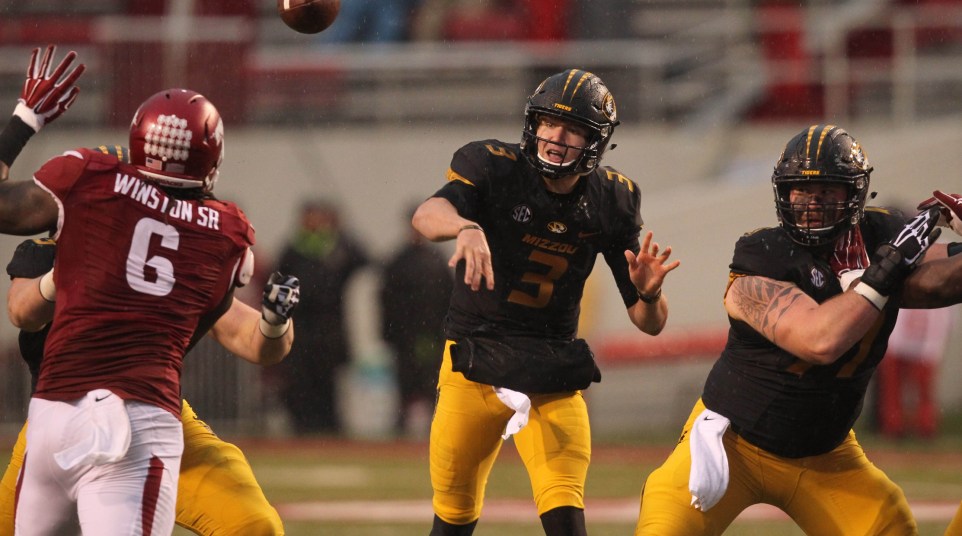
Is SEC East title window closed for Mizzou and South Carolina?
Florida won the SEC East title going away in coach Jim McElwain’s first season, and should be very much in the hunt again this fall.
Georgia, the most consistently successful SEC East team in recent years, has a new coach in Kirby Smart and enough talent to be a genuine threat to win the division.
Tennessee, winners of six straight games to finish off 2015, returns a host of starters and will be a trendy pick to win its first SEC East crown since 2007.
So, with all of the buzz and momentum surrounding the traditional SEC East powers this spring, where does that leave the title hopes for South Carolina and Missouri?
It’s easy to write them off, looking only at last season where both schools finished below .500 and made far more headlines off the field than on it.
A slightly larger sample size of recent history reveals the fact that the Gamecocks (2010) and Tigers (2013, 2014) have won three of the past six SEC East championships.
So, while it’s a decent bet that one of the “big three” schools will claim this year’s crown, let’s not declare the title window permanently closed for the rest of the division.
Here are a few reasons it wouldn’t be wise to overlook the rest of the East in the long term:
EXPECTATIONS VS. REALITY
It’s one thing to look good on paper, but history shows that things don’t always go according to form.
Consider the 2013 season. Georgia (No. 5), South Carolina (6) and Florida (10) were all ranked inside the top 10 in the preseason Associated Press Top 25 poll.
Missouri, on the other hand, was entering its second year in the league after finishing 5-7 overall and 2-6 in conference games. The Tigers weren’t on anyone’s radar as a possible SEC East champion.
But Missouri beat Georgia and Florida en route to a 7-1 SEC record and an East title that season, turning those predictions into folly.
Even last year, the preseason media poll had Florida pegged fifth in the SEC East. Of course, that’s the same poll that produced Alabama as the SEC West champion, but had Auburn as the winner of the title game.
So, it’s important not to take preseason predictions too seriously.
SCHEDULING
Sometimes, teams get a helpful break on the schedule.
Take the 2014 Missouri squad that won the East by a game over Georgia. The Tigers drew Texas A&M and Arkansas out of the West, teams that finished sixth and seventh, respectively, in that division.
So, despite falling 34-0 to Georgia in October, the Tigers managed to win the rest of their league games to edge the Bulldogs for the title.
This season, an overly optimistic Gamecocks fan would point out that South Carolina pulls Texas A&M and Mississippi State from the West and has a five-game home stretch in the middle of the season that includes games against Tennessee and Georgia.
Since the SEC schedule isn’t balanced, sometimes the luck of the draw plays a role in determining division champions.
INJURIES
Injuries are the great unknown when prognosticating college football teams.
How would Tennessee look without Joshua Dobbs at quarterback for a game or two? How would an injury to Derrick Henry have affected the Crimson Tide in last year’s run to the national championship?
Georgia running back Nick Chubb, Auburn defensive end Carl Lawson and Missouri running back Russell Hansbrough were just a few of the key players who suffered injuries bug in 2015 — and their absence proved harmful to their respective squads.
There will be plenty of entries on the 2016 list as well. Any team, no matter how talented, can be upended if it has too many players spending time in the training room.
TEAM OF DESTINY
Every once in a while, a team just finds a way to win enough games to win championships.
Don’t believe in destiny? Tell that to the 2013 Auburn Tigers.
Auburn finished the season with a SEC West title, won the SEC Championship Game over Missouri and almost captured the national championship before falling in a 34-31 nail biter to Florida State.
All it took was a high-powered rushing attack, just enough defense and two of the most iconic plays from the SEC in the last decade.
There was nothing fortunate about the “Kick-Six” against Alabama, but it took an unusual set of circumstances for a long field goal try to find its way into the hands of Auburn’s Chris Davis — who then went on a 109-yard scamper into college football lore.
“The Prayer at Jordan-Hare,” on the other hand, was pure luck.
On 4th-and-18 with 36 seconds left, the Tigers trailed Georgia by a point. Auburn quarterback Nick Marshall heaved the ball down the middle of the field, hoping the lanky Ricardo Louis could go up and haul it in. Louis was well covered, and Georgia’s Josh Harvey-Clemons deflected the pass.
Ninety times out of a hundred, that ball falls harmlessly to the turf. Nine other times, it settles in the arms of a Bulldog defender. In all of those cases, Georgia has the ball back and is taking knees to end the game.
On this November evening, however, the football found its way into Louis’ hands. He never broke stride on his way into the end zone, and the rest is history.
